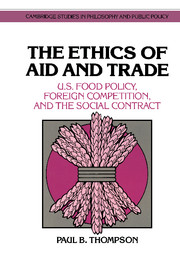Book contents
- Frontmatter
- Contents
- Acknowledgments
- Introduction: Of cabbages and kings
- 1 The food weapon and the strategic concept of food policy
- 2 The Bumpers Amendment
- 3 Does helping foreign industries violate a basic principle of government?
- 4 International agricultural assistance and the interests of U.S. agriculture
- 5 The trading state and the social contract
- 6 Humanitarianism, hunger, and moral theory
- 7 Morality and the myth of scarcity
- 8 The time has come, the walrus said, to speak of many things
- Notes
- References
- Index
4 - International agricultural assistance and the interests of U.S. agriculture
Published online by Cambridge University Press: 20 May 2010
- Frontmatter
- Contents
- Acknowledgments
- Introduction: Of cabbages and kings
- 1 The food weapon and the strategic concept of food policy
- 2 The Bumpers Amendment
- 3 Does helping foreign industries violate a basic principle of government?
- 4 International agricultural assistance and the interests of U.S. agriculture
- 5 The trading state and the social contract
- 6 Humanitarianism, hunger, and moral theory
- 7 Morality and the myth of scarcity
- 8 The time has come, the walrus said, to speak of many things
- Notes
- References
- Index
Summary
A growing literature discusses the beliefs and perceptions of key actors and interest groups that supported the Bumpers Amendment. The theme that emerges most clearly is a critique of the effect that foreign agricultural assistance is perceived to have on U.S. farm exports. Although an extensive discussion of the economic arguments that have been assembled to form this critique is not germane to the philosophical point under review, these arguments are sometimes offered in direct response to the interest argument proposed in Chapter 3, and are, in turn, relevant to more Hobbesian readings of social contract theory. What is more, these economic arguments represent the predominant response to the Bumpers Amendment and to the sentiments that spurred it along. They provide a convincing case for concluding that the agricultural interests enlisted in support of the law would ultimately be thwarted were it to be enforced. The Linking Thesis (LT) (discussed in Chapter 1) is clearly relevant to such an argument. Although this conclusion should clearly provoke curiosity among farm groups, the dominance of economic arguments has the unintended effect of implying that the interest considerations of U.S. agriculture are the crucial test for setting international agriculture assistance policy. This is not, however, the intent of the LT argument. Such an implication must be resisted, if a justified development assistance policy is to be found.
- Type
- Chapter
- Information
- The Ethics of Aid and TradeU.S. Food Policy, Foreign Competition, and the Social Contract, pp. 80 - 97Publisher: Cambridge University PressPrint publication year: 1992



